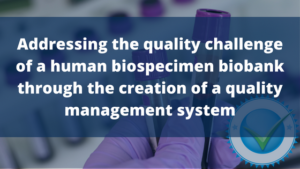The development of human tissue biobanks is now considered as an indispensable tool for the progression of biomedical research and the development of new therapeutic strategies in personalized medicine (population stratification, biomarker discovery,…). At present, one of the challenges of human biospecimen biobanks is to provide quality-assured materials as well as accurate and reliable associated data (biospecimen are defined as tissues or blood derivatives removed from the patient).

There is a recognized need to develop more standardized and harmonized technical procedures for the constitution of biobanks, especially in terms of biospecimen collection and associated data. In this context, the purpose of the COMET (COllection of MEtabolic Tissues) biobank project is to create a high-quality collection of insulin-sensitive tissues (liver, muscle, adipose tissues and epiploic artery) and blood derivatives (DNA, RNA, plasma and serum) collected from grade 2–3 obese patients (body mass index [BMI] ≥ 35 kg/m2) undergoing bariatric surgery. The overarching goal of this biobank is to promote translational and pharmaceutical research in the field of type 2 diabetes (T2D) and related metabolic disorders.
Read this paper to know more.
